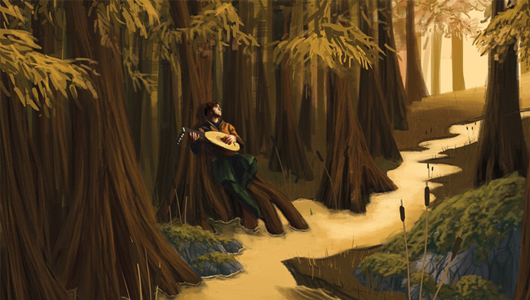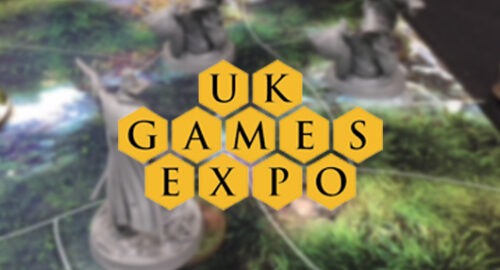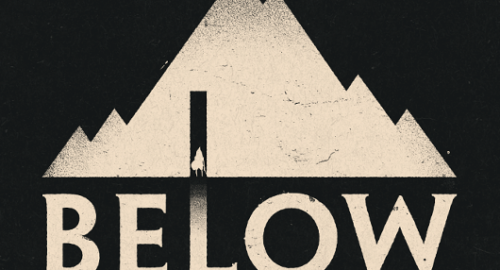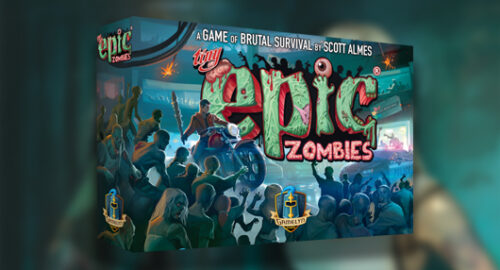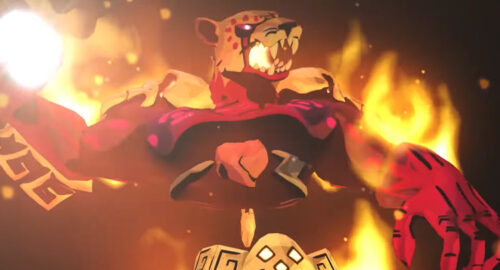Forest of Fate: A Storytelling Survival Adventure is a cooperative multiplayer quest game, where players try to overcome a long series of randomised encounters using their talents: their wits, guile, care, might, speed and style. The result is a mix of Dungeons and Dragons and Choose Your Own Adventure, a cousin to the Fighting Fantasy or Sorcery! game books, but with a randomised Rogue-like element and a party of adventurers. Players be warned: this is a cruel game, with an “old school” unfair world where death lurks around every corner. But if you want a lightweight, choice-based game to play without much commitment, and you have ample tolerance for (narrative) pain, Forest of Fate might be for you.
• Designer: Phil Hazelton
• Publisher: Cards of Fate
• Number of Players: 2-6
• Playing Time: 30-60 Minutes

Between two and six players can play an adventure, with each picking both a character from a roster of fantasy archetypes (warrior, thief, shaman, bard, warlock, and ranger), each with four of six base skills, two “good” and two “great,” with the remaining two absent. Each player also picks between one of two special abilities for that class. Using these abilities typically costs a life, but allows a variety of useful effects, including preventing damage, healing, preventing character deaths, and boosting attributes. Notable here are the ranger’s Sound the Alarm skill, which allows the players to backtrack after receiving the first half of the outcome, and the shaman’s Second Sight, which allows players to redo an encounter and make different choices. Players who find the game frustratingly random may find these skills help mitigate that problem, though at a price.
The players traverse a path in the eponymous Forest of Fate through a randomised sequence of face down location cards. At each node, the party encounters an obstacle, and are shown four skills, representing potential ways of solving the problem. Each node has four different sets of outcomes, determined by the direction the players entered the node from. Success is a matter of matching the characters’ skills to the task at hand, sending one character to use a particular approach. Do you send the thief to sneak? The bard to charm? The wizard to outwit? Do you protect your wounded characters or the ones with useful skills? The game proceeds through a storybook, available online, or in printout versions. The players look up the number (corresponding to the direction they approached from and the skill they used) in the manual, then read off the outcome. This proceeds in two parts, with a break in the middle for suspense. The text is action-oriented and concise, and the game gets a solid if not brilliant grade for writing.
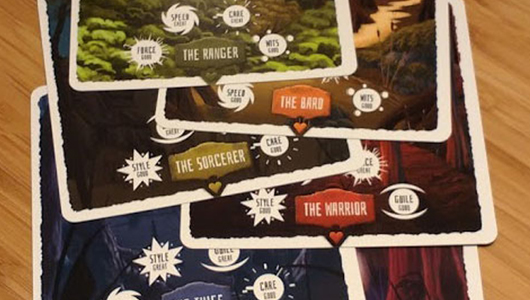
If the players succeed at a challenge, they overcome the obstacle and may gain a bonus, either a temporary buff to their abilities or an item that can be used to bypass future nodes. If they fail, the character attempting the challenge will lose some amount of life, and possibly receive a temporary penalty. The party will also have to go around the obstacle, costing each character one life. Once the players have overcome all the obstacles (or died horribly), they are treated to a brief endgame vignette based on how many items they recovered, and how many of their comrades survived.
The game isn’t as satisfying as I’d like, and the biggest culprit here is agency: the game can feel unfair and out of the players’ control. It shares the cruel and unpredictable world with its CYOA forebears, where seemingly good choices can lead to awful outcomes. This makes the choices less obvious, but also frustrates player agency and undermines the power fantasy. If you play the warrior class, but lose too often in open combat with monsters, you may begin to wonder what being “great” at fighting means in Forest of Fate. It clearly doesn’t mean you can fight your enemies to get past them. Even “epic” buffed skills fail frequently, despite challenges where the skill seems appropriate. An occasional reversal is fun, but this is a bit over the top.
The “pick an approach” gameplay also erodes the sense of player agency, because the skills do not clearly indicate the actions they represent. The “care” ability is used to represent patience and caution, and occasionally mercy. So, does that mean moving carefully around an angry forest creature, soothing it with calming words, or waiting for it to wander away? “Guile” means using stealth and deception, but does that mean deceiving a pair of guards, sneaking past them, or setting a trap for them? Most of the time, the result is intuitive, but it doesn’t take many cases of “that’s not what I meant to do!” to undermine the illusion of agency. You end up thinking not “should we sneak past, outwit, or fight this monster” but rather “what does using wits even mean here”? The game becomes authorial mind-reading, or genre-savvy trope reasoning, both of which break the immersion.
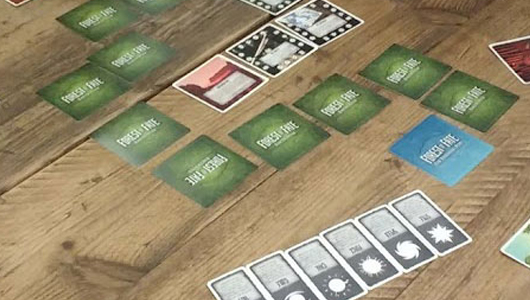
Unfairness was fine (even entertaining) for a CYOA storybook, where you could always return to previous points and try again. But for a multiplayer game with no take-backs (except for the previously mentioned skills), this can be punishing. Winning encounters makes future encounters easier, as items can be used to bypass challenges, and having high life totals makes using skills less of a risk. But once a party starts to lose health and characters die off, the game becomes harder and harder. The party mood can turn grim, especially if the deaths felt unfair for the reasons mentioned above. There is even an optional “ghosts of deceased players haunt the living” mechanic, but in this already fickle game, it feels unnecessary.
Forest of Fate relies on players being unaware of the consequences of their actions, but the scenarios and outcomes are fixed and limited. Once veteran players have run a few adventures, they will recognise some of the encounters. This creates an awkward choice between informing their party, thereby spoiling the fun, or holding their tongue, which removes them from the discussion. There are a variety of “quests” to choose from, but this amounts to nothing more than determining your starting item. All Rogue-likes suffer once you begin to recognise the building blocks of the supposedly randomised quests, but here the problem is acute, with a weak balance between surprise and familiarity. There is some space to be explored trying to find different solutions to problems, but this feels more like exhausting the game than exploring new territory.
Forest of Fate tries a novel approach to a storytelling game, adding game-like elements to spice up the narrative, and provide a Dungeons and Dragons-like experience in a lightweight package. The variance between how easy this feels when you get lucky, how punishing it feels when it goes wrong, and especially how little agency you have in determining your party’s fate, stops this from being better.
